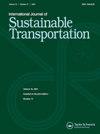Methodology for developing models to estimate vehicle instantaneous energy consumption based on hub-type dyno test data
IF 3.1
3区 工程技术
Q2 ENVIRONMENTAL STUDIES
International Journal of Sustainable Transportation
Pub Date : 2025-02-01
DOI:10.1080/15568318.2025.2459616
引用次数: 0
Abstract
This paper describes a methodology to develop simple energy consumption models of road vehicles exploiting transient experimental datasets obtained from a vehicle/powertrain four-dyno testbed available at the Center for Automotive Research and Sustainable mobility (CARS@POLITO) of Politecnico di Torino. These models, based on a locally weighted linear regression method, can serve as a simpler alternative to more conventional methods based, for example, on engine maps obtained by steady-state characterization at engine testbeds, and combined with powertrain subsystem models. The present methodology was applied to a conventional diesel-powered vehicle. Three different modeling approaches are proposed: vehicle-based (VB), engine-based (EB) and engine-based modified (EB*). The VB approach is the simplest, being able to estimate the vehicle fuel consumption by only using, as inputs, wheel torque and speed, while the EB and EB* approaches enhance modeling accuracy by using engine speed and torque, as inputs, along with transmission-related parameters and/or by considering the moments of inertia of the powertrain rotating parts. The manuscript describes, in full, the process used to develop these models, providing significant guidance for researchers who may want to replicate the procedure with their own experimental data. These energy consumption models can be useful tools for the development and assessment of eco-driving or ADAS functions or for energy consumption comparison between different vehicles that were not tested on the same driving cycle. They can also support the estimation of the total energy consumption of vehicles along different traffic conditions or routes, based on a limited number of experiments and low computational effort.
基于轮毂动态测试数据的车辆瞬时能耗估算模型开发方法
本文描述了一种方法,利用从都灵理工大学汽车研究和可持续移动中心(CARS@POLITO)提供的车辆/动力系统四动态试验台获得的瞬态实验数据集,开发简单的道路车辆能耗模型。这些基于局部加权线性回归方法的模型可以作为更简单的替代方法,例如,基于发动机试验台稳态表征获得的发动机图,并结合动力总成子系统模型。本方法应用于常规柴油动力车辆。提出了三种不同的建模方法:基于车辆的建模(VB)、基于发动机的建模(EB)和基于发动机的修正建模(EB*)。VB方法是最简单的,仅使用车轮扭矩和速度作为输入即可估计车辆油耗,而EB和EB*方法通过使用发动机转速和扭矩作为输入,以及与传动相关的参数和/或考虑动力系统旋转部件的惯性矩来提高建模精度。该手稿完整地描述了用于开发这些模型的过程,为那些可能想要用自己的实验数据复制该过程的研究人员提供了重要的指导。这些能源消耗模型可以成为开发和评估生态驾驶或ADAS功能的有用工具,也可以用于比较未在同一驾驶循环中测试的不同车辆之间的能源消耗。它们还可以基于有限数量的实验和较低的计算工作量,支持在不同交通条件或路线上估计车辆的总能耗。
本文章由计算机程序翻译,如有差异,请以英文原文为准。
求助全文
约1分钟内获得全文
求助全文
来源期刊
CiteScore
8.90
自引率
2.60%
发文量
56
期刊介绍:
The International Journal of Sustainable Transportation provides a discussion forum for the exchange of new and innovative ideas on sustainable transportation research in the context of environmental, economical, social, and engineering aspects, as well as current and future interactions of transportation systems and other urban subsystems. The scope includes the examination of overall sustainability of any transportation system, including its infrastructure, vehicle, operation, and maintenance; the integration of social science disciplines, engineering, and information technology with transportation; the understanding of the comparative aspects of different transportation systems from a global perspective; qualitative and quantitative transportation studies; and case studies, surveys, and expository papers in an international or local context. Equal emphasis is placed on the problems of sustainable transportation that are associated with passenger and freight transportation modes in both industrialized and non-industrialized areas. All submitted manuscripts are subject to initial evaluation by the Editors and, if found suitable for further consideration, to peer review by independent, anonymous expert reviewers. All peer review is single-blind. Submissions are made online via ScholarOne Manuscripts.

 求助内容:
求助内容: 应助结果提醒方式:
应助结果提醒方式:


